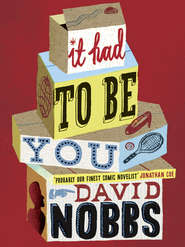По всем вопросам обращайтесь на: info@litportal.ru
(©) 2003-2025.
✖
A Bit of a Do
Автор
Год написания книги
2019
Настройки чтения
Размер шрифта
Высота строк
Поля
‘I’ve got some in the car, if you’d like to see them.’
‘Well, I’d … but I don’t want to put you to any trouble.’
‘No trouble. I’d like to see what you think.’
Ted rushed out before anybody could dissuade him.
There was a brief, awkward pause.
‘How’s Mother?’ asked Laurence.
‘The doctors seem quite pleased with her,’ said Rita.
‘Jolly good. I was sorry to hear about it.’ There was another pause, mocked by the apparently easy chatter that was welling up all around them. ‘How was the South of France?’
‘Very nice, considering. We only had rain once, but he came out in this terrible prickly heat.’
‘Oh dear! Where?’
‘Well …’ Rita dropped her voice, to make sure that no more dentists would hear her than was absolutely unavoidable. ‘In a rather awkward place.’
‘I meant … in what town?’ Laurence’s face wore a look of faint amusement at the absurdity of all the world except himself.
‘Oh! Avignon. He had to give the bridge a miss.’
There was another pause, in that early evening of pauses.
‘The weather in Peru is usually very predictable,’ said Laurence. ‘It’s dry in the dry season and wet in the wet season.’
‘Well, I suppose it would be.’
‘But, funnily enough, it wasn’t when we were there. It had all gone topsy-turvy.’
‘It’s all these satellites.’
Rita wished she could lose her talent for producing conversation stoppers.
Ted removed his sample case from the boot of his Cavalier 2000 GL, looked round the dark, oily, glassed-in car park of the old coaching inn, and went through the narrow passage that linked it with the. outside world. He stood on the pavement of Westgate, gulping in the comparatively fresh air, less polluted these days – partly because of genuine environmental progress, partly because the bulk of the county’s pollution was exported on the prevailing winds to the lakes and forests of Sweden, and partly because so many of the factories were shut down.
Dusk had descended on Dolcis, and Lotus, and Saxone, and Freeman, Hardy and Willis, and on the marbled facades of the Halifax, Abbey National, Leeds, Harrogate and Wakefield Building Societies, and on the grimy concrete mass of the Whincliff Shopping Centre, and on the offices of the Argus, which had been painted off-white and were now off-off-white, and on all the other buildings of the sloping, curving, once-lovely street.
Three young welders on a pub crawl were hunched against the rising wind as they struggled from The Blue Posts to The Three Tuns, and a coachload of laughing women descended from a blue village bus and made their way arthritically down West Riding Passage to the bingo in the old Regal in Slaughterhouse Lane.
Simon Rodenhurst, of Trellis, Trellis, Openshaw and Finch, drove his red MGB into the car park of the Angel Hotel, and didn’t see Ted.
How Ted wished he was spending this evening somewhere unpretentious, like the dear old Crown and Walnut.
He sighed, and returned to the Gaiety Bar.
Perhaps it was because of the extreme discomfort of the chairs, or perhaps it was because of the natural herd instincts of the English, but the gathering throng of dentists and their guests were standing shoulder to shoulder around the bar, as if penned there by an invisible sheepdog.
‘This time last year she would have danced till dawn. She had more energy than anybody.’ The immaculate Neville Badger’s voice cracked. ‘I’m sorry.’
‘Neville!’ said Liz.
‘Embarrassing, isn’t it? The man keeps breaking down in public. And him a past captain of the rugby club. Funny how you can never tell the ones with no moral fibre.’
‘Neville! Don’t be absurd.’ Liz kissed him. ‘Dear Neville!’
What on earth was Ted showing her husband, with Rita such an aghast spectator?
‘Other people’s tragedies are so desperately boring, aren’t they?’ said Neville Badger.
‘What? Oh, Neville, no! You could never bore me. No, I was just intrigued to know what Ted’s showing Laurence.’
Ted was showing Laurence a boot scraper. There were rungs for scraping boots, and beside them, at one end, the upturned face of Clement Attlee, moulded in lead and ridged for the reception of mud.
‘Clement Attlee,’ said Ted.
‘Amazing,’ said Laurence.
‘Thank you for a great evening – Des,’ said a smiling photograph of Des O’Connor. Nobody could remember ever seeing him in the Angel Hotel, but he must have visited it when appearing at the theatre.
‘You’ve got to have them these days, gimmicks,’ said Ted. ‘I mean … who could resist grinding his boots on the face that nationalized the railways?’
He produced a similar object, with the face of Sir Winston Churchill complete with lead cigar. Laurence frowned his disap proval of this liberty, but Ted said, ‘It’s got to be bipartisan, has business.’
‘Do you … er … do you have any of the present incumbent?’ asked Laurence.
‘No,’ said Ted. ‘I tried, but the mould cracked.’
Jenny entered. She was wearing a patterned south Indian dress which prettily solved the problem of not outraging the conventions while not conforming to them. She was beginning to show distinct signs of pregnancy, if you looked hard enough, and since she was attractive, people often did. Only that week the manager of Beacock and Larkin’s, gents’ outfitters but a ladies’ man, had placed a hand on her stomach ‘to see if I can feel it moving’, and that hadn’t fooled her, and she had taken her custom elsewhere – to Leonard’s, of Bridge Street, if the truth be known. The custom in question had consisted of a tie for Paul to wear tonight, his only tie having been chewed by the unruly mongrel of some visiting anarchists. And then, after all that, Paul had refused to wear a tie. All in all, the purchase couldn’t be said to have been one of Jenny’s most conspicuous successes.
‘Dad?’ she said, approaching them just as Ted snapped his sample case shut. ‘They won’t let Paul in without a tie.’
‘Oh, the silly boy,’ said Rita.
‘Do you know how many wars there have been in the world since the Second World War?’ said Jenny.
‘What?’ said Laurence.
‘I’ll tell you. Fourteen. That’s just major international wars. It doesn’t include civil wars or border skirmishes. Well, in the context of all that misery, does it honestly matter whether Paul wears a tie?’
‘Of course not,’ said Laurence. ‘So why is he making such a fuss?’
‘He isn’t. Society is. He isn’t saying people can’t wear ties. Society is saying they must.’
Dame Peggy Ashcroft looked as if she had heard this sort of thing many times before. None of the regulars could remember seeing her in the Angel Hotel, but she must have been there more than once if her message, ‘Excellent as always – Peggy’, was anything to go by.











